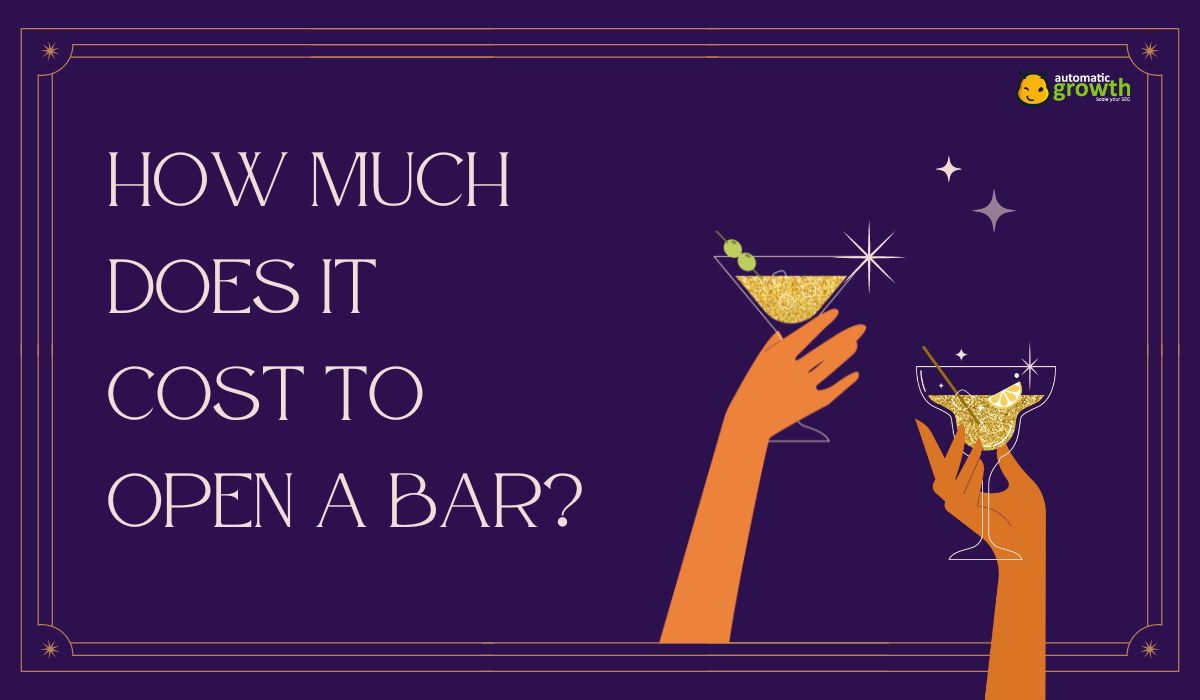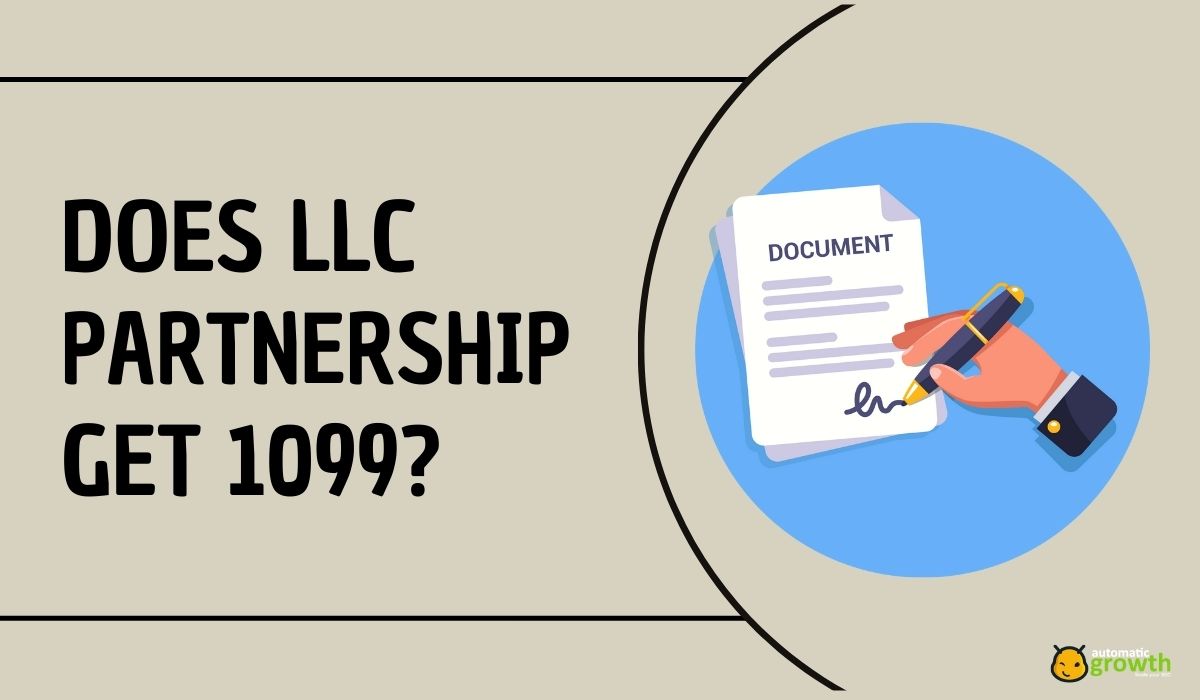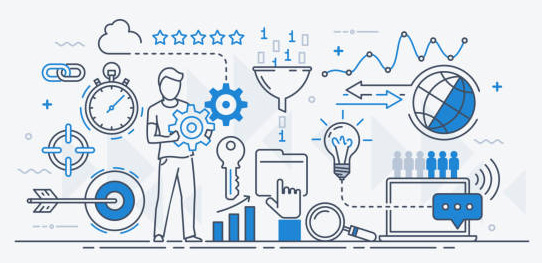Opening a bar can be an exciting venture for many entrepreneurs, blending passion with profit. However, like any restaurant business, it comes with its own set of financial considerations. From obtaining licenses and securing a venue to stocking up on beverages and hiring staff, the costs can quickly add up.
One pressing question many aspiring bar owners have is: How much does it cost to open a bar? Whether you're dreaming of a cozy local tavern or a bustling city hotspot, understanding the financial intricacies is the first step towards turning your vision into reality. This guide provides a comprehensive breakdown of the expenses involved, helping aspiring bar owners make informed decisions and set realistic budgets.
Let’s Talk Numbers: How Much Does It Cost to Open a Bar?
For aspiring bar owners, one of the primary concerns is understanding the financial costs: How much does it cost to open a bar? Before deciding whether venturing into the bar industry is a worthy investment, it's crucial to assess both the initial cost required to get started and the operational expenses.
On average, the startup cost for a bar is approximately $425,500 in the United States. However, this figure may vary depending on several factors. In some cases, opening a bar requires an investment of $174,000 to $850,000. While some bars may start turning a profit within six months, others might take up to two years before you see a return on investment.
Startup Costs of Opening a Bar
The initial expenses of opening a bar are influenced by a myriad of factors. Understanding these factors based on your business model can help you establish just how much startup costs you need.
1. Location
The chosen location for your bar significantly influences your financial outlay. Securing an existing neighborhood bar might set you back a modest $25,000, whereas starting a fresh establishment in a city's bustling downtown might require an investment exceeding a million dollars.
2. Type of Bar
Your envisioned bar type—be it a cozy pub, sports lounge, brewpub, or a buzzing club—will have a bearing on your initial costs. While a basic neighborhood bar might start around $25,000, more specialized ventures like a wine bar or brewpub could demand over $100,000, contingent on location and offerings.
If you're eyeing a club setup, anticipate steeper costs, often soaring over $500,000. This rise is attributed to the more significant space, utility, and equipment demands of clubs.
3. Rent vs. Purchase
Opting to rent will mean budgeting for a security deposit and potential advance rental payments. Conversely, purchasing property could involve mortgages spanning between $200,000 and $850,000, contingent on size and site.
4. Starting Fresh or Buying an Establishment
The decision to kickstart your own bar from scratch or to acquire an existing one can swing costs dramatically. An already functional bar could be yours for a mere $25,000. However, starting afresh entails budgeting for design, permits, and construction overheads.
5. Renovation and Decors
Deciding to give your bar a fresh look can be exciting, but how much you spend will depend on the changes you're dreaming of. For some, a simple facelift might mean splashing on new paint, laying down fresh flooring, and updating a few fixtures. Such basic makeovers can set you back between $5,000 to $10,000.
However, if you're imagining a complete transformation and renovation, the costs can skyrocket. Especially if you're looking to upscale the place or expand its size. In some cases, revamping costs can touch $100,000 or more. This isn't just about materials; you might also need to hire designers to shape your vision and contractors to bring it to life.
6. Equipment
When you're gearing up to open your bar, you have three main ways to get the equipment you need:
-
Buy New: This is the costliest but will last the longest.
-
Buy Secondhand: It may not last as long as new stuff, but with good care, you can extend its life.
-
Lease: You can rent equipment. This means less money upfront but could increase your monthly bills.
Now, let's break down the equipment you might want for your bar, along with some average prices:
-
Dump Sink: $300 - $1000
-
Taps: Around $1000 each for a direct draw system.
-
Kegerator: $2800 - $5000
-
Soda Dispensers: Usually given by the soda company.
-
Shelves: $100 - $400
-
Countertop: $575 - $1750
-
Ice Well: $380 - $3000
-
Rails: $25 - $800
-
2-Door Fridge: $1500 - $4000
-
Glass Washer: $3500 - $13,000
-
Ice Machine: $2000 - $8000
-
Glasses: $1 - $6 each
-
Security Systems: $1000 - $5000
-
Bar Tools: $200 - $1000 for each setup
You might also think about extras like TVs, pool tables, or dartboards. Their prices can really vary based on what you want. Lastly, don't forget the starting stock of food and drinks. Depending on your menu, you might spend anywhere from $500 to a whopping $10,000.
7. Licenses and Permits
Different places have different rules about licenses, permits, and insurance. One of the first things you'll need if you're opening a bar are alcohol sales and liquor license. There are two main types: one just for beer and wine, and a pricier one that lets you serve liquor too.
These licenses dictate when you can serve drinks and for how many hours. Getting a liquor license takes time, so it's a good idea to start early. A basic license might cost around $3,000, but if you want to serve everything – beer, wine, and liquor – you might pay anywhere from $12,000 to a whopping $400,000. Typically, these last between 1 to 3 years.
Here are some other important things you might need:
-
Building Permit: If you want to build or change the structure.
-
Business License: This is a must-have. The costs for a business license range between $200 and $1,200.
-
Bar Insurance: This could be $2,000 - $6,000 every year. Some places say you have to have this.
-
Entertainment License: This is for playing music. It's $1,500 - $10,000 yearly.
-
Fire Safety Certificate: About $100, this checks your place is safe from fires and tells you how many people can be inside at once.
-
Liability Insurance: This helps if someone gets hurt at your place. Some states say you must have this.
Recurring Expenses of Running a Bar
Opening a bar involves more than just the initial setup costs. To ensure long-term success, it's crucial to understand the recurring expenses associated with running a bar business. These ongoing costs can range from rent and utilities to staff salaries, inventory replenishment, and maintenance.
Grasping these costs allows owners to budget effectively and ensures the bar remains profitable in the long run. Let’s take a closer look at the average monthly expenses:
-
Rent or Mortgage - Your monthly payment will change based on your place's size and where it's located.
-
Licensing and Permits - You'll need to renew some licenses every year. So, remember to save some money every month for this.
-
Utilities - Your water, electric, and gas bills will change a little every month. But for most bars, this costs around $2500 on average.
-
Taxes and Fees - You'll have different types of taxes to pay, and the amount might change depending on where your bar is.
-
Accounting and Legal Help - It'll cost about $240 to $600 a week for an accountant. And if you want a lawyer to check your paperwork, that might cost between $500 to $2000 every year.
-
Maintenance and Fixes - Small fixes and regular upkeep come from your pocket. On average, this might be around $1000 a month.
-
Advertising and Marketing - Try to spend 3-6% of what you earn every month on promoting your bar. Social media promotions and ads can help you spread the word about your business.
-
Salaries - About 30% of what your bar earns will go to paying your staff. For most bars, that's about $8,250.
-
Buying Supplies - If 25% of your bar's monthly income goes to goods and drinks, you'll be spending about $6,875 on new stock.
Is Opening a Bar a Lucrative Investment?
Opening a bar can indeed be a lucrative investment, but its success largely hinges on various factors, including location, management, concept, and the overall market demand.
The profitability of bars is often reflected in their profit margins. On average, well-managed bars can expect a margin between 10% to 15%. This suggests that after accounting for all operating expenses, such as rent, utilities, wages, and inventory costs, every dollar earned translates to a profit of 10 to 15 cents. Some establishments might start to see returns in just half a year, while for others, it might stretch up to two years.
While opening a bar can be financially rewarding, it's imperative to assess the market, manage expenses, and offer something distinctive to ensure sustained profitability. Proper groundwork, a well-structured business plan, and continuous performance evaluations can help launch your business to success.
Discover High-Profit Ventures With Low Startup Costs
As with any business, opening a bar is not merely about the startup investment but how one manages and recoups those costs. The bar industry, with its potential for high returns, can indeed be lucrative, but it demands a keen understanding of the market, a unique proposition, and meticulous financial planning.
Yet, if the costs and risks of the bar business seem too steep, fear not! There's a world of business opportunities out there with low startup investments that yield impressive profits. Are you ready to explore these ventures? Let the journey to high returns with minimal costs begin!
















